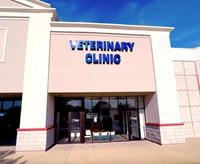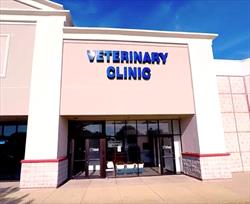
Vatterott vet tech program

Screenshot from Vatterott video tour on YouTube
The veterinary technician program at Vatterott College operated out of a shopping center in Fairview Heights, Illinois.
Jessika Besserman made sure the holidays were as fun and happy as ever for her two children, but inside she struggled with frustration and concern about the future. A week before Christmas, the veterinary technology degree program that she would have completed in a matter of 12 weeks abruptly shut down.
On Dec. 17, the director of Vatterott College's Fairview Heights campus in southwestern Illinois gathered faculty and students together to say the school would close — for good — in one hour. Similar announcements played out across the for-profit career school's 14 other campuses in Missouri, Oklahoma and Tennessee.
It was a shock for everyone, and instructors and students in Vatterott's veterinary technician program had an added concern: the future of the 40 or so animals in their care.
They negotiated with school officials for a reprieve. For a few hours the day after, they put their personal disappointment and worries aside, returned to campus and found homes for the dogs, cats, mice, rats, reptiles, birds, rabbits and fish they had tended as students and faculty.
"After we got the animals out, I just came home and sat in the dark house and cried," Tina Welmon, a veterinary technician and an instructor in the program since 2014, told the VIN News Service. She took home a cockatoo.
Veterinary technicians provide support to veterinarians and serve a role similar to that of nurses in human medicine. A veterinary technology degree is a prerequisite in most states to becoming licensed as a veterinary technician.
Welmon was the third person to be hired in Vatterott's veterinary technician program. She started in August 2014, five months after it began. She said the program had about 55 students.
Multiple calls by VIN News to Vatterott Educational Centers Inc., the Berkeley, Missouri-based corporation that owns the college, were not returned.
Vatterott cast blame for its demise on issues outside its control. A letter to students posted on its website states: "To our deep regret, changes in economic and regulatory conditions in recent years have had a significant, prolonged, negative impact on the Vatterott institutions."
The letter goes on to say that Vatterott tried to address challenges by selling to an unidentified buyer but was unable to continue operations and see the sale through after the U.S. Department of Education "decided to significantly increase restrictions on Vatterott's participation in the federal financial aid programs."
This was an apparent reference to rules established by President Barack Obama, who made a priority of reforming for-profit colleges after repeated investigations and lawsuits revealed that many schools were making false promises to students and burdening them with debt they couldn't pay off in their chosen career. Obama's gainful employment rule requires that for-profit career-training programs and non-degree programs at community colleges meet specific debt-to-income ratios for graduates. If graduates on the whole end up with outsize debt relative to their incomes, the programs cannot access federal financial aid available under Title IV of the Higher Education Act.
The USDE recently announced plans to eliminate the gainful employment standard by next year. Under Education Secretary Betsy DeVos, the department consistently has worked to reverse Obama-era reforms. The rule, which went into effect in 2015, has led many schools to close. A USDE webpage lists nearly 30 for-profit institutions — covering scores more individual schools and colleges — that have shuttered.
Last year, 39 Vatterott College programs failed to meet the gainful employment standard for the first time. Programs that fail two out of three years become ineligible for federal financial aid. The veterinary technician was not among the programs that failed, but its fate was tied to the poor condition of the institution overall.
On Dec. 5, the Accrediting Commission of Career Schools and Colleges (ACCSC) revoked Vatterott's accreditation, saying that "…Vatterott College failed to demonstrate compliance in areas of student achievement and continuity of management." Student achievement benchmarks include rates of graduation and employment in the field for which they have been educated.
The ACCSC, recognized by the USDE as an independent accrediting body for post-secondary, trade and technical schools, also requested a "teach-out" plan, whereby the college ensures that current students have the opportunity to finish their program of study at Vatterott or another accredited institution.
Vatterott did not appeal the ACCSC decision nor did it present a teach-out plan. The college wrote in the letter to students, "We are working to identify other schools that may be able to take current students on transfer, so that those who have not yet graduated will have the opportunity to complete their program or one similar to it."
Ten days after the closure, vatterottcollege.edu had posted resource information from state education departments in Illinois, Missouri and Tennessee, as well as links to programs offering to help Vatterott students complete their studies.
What happens next?
In addition to what may be worthless credits and lost time, many students are carrying thousands of dollars in debt. According to disclosures required by the USDE, students in Vatterott's veterinary technician degree program typically graduate with $28,697 in debt. Some may be eligible for something called closed-school loan discharge, whereby the government forgives the loans of student loan borrowers if their program closes while they are enrolled and if they do not transfer their credits elsewhere.
Loan discharge is another program that the USDE under DeVos has been reluctant to support. But in September, a judge called the department's delays illegal. The department was ordered to begin discharging loans, and in mid-December, federal education officials announced they would do so. The new rules require the department to automatically forgive the loans of eligible borrowers three years after their schools closed. Borrowers may speed up the process by applying for forgiveness earlier. The government also will refund any applicable loan payments made.
Welmon pointed out that not all students used federal loans to pay for school. Some did not qualify for loans; others relied on help from parents or paid out of pocket. Their financial losses cannot be recouped.
Although Besserman received federal loans, they aren't her main focus. "I'm not concerned with the loan money, I'm more concerned with the two years of my life I spent working for a degree," she said. "It's the time I was away from my kids to do school. It was the extra hours I missed from my job to take care of the boarded animals. It's the stuff that I can't get back that I'm more concerned about."
Besserman has been scrambling along with fellow students to find programs that might accept some of her credits. A mother of two young children, she said she's not in a position to start classes all over again in a brick-and-mortar school.
So far, she said, she and her fellow students, who are staying in close contact, have not found a veterinary technician program that will accept their credits toward a degree.
Besserman wonders why it's not easier to transfer credits between programs accredited by the American Veterinary Medical Association Committee on Veterinary Technician Education and Activities (AVMA CVTEA). CVTEA is the sole accreditor of veterinary technician programs in the United States. In most jurisdictions, graduation from a CVTEA-accredited program is one of the criteria used in determining eligibility for the Veterinary Technician National Examination (VTNE).
Besserman said that, as students, they had to learn a certain skillset established by the AVMA. Even though different programs may have different ways of teaching skills, she said, everyone needs to learn the same things. She wonders why credits don't transfer more easily. "That's my confusion," she said.
She's not alone. Many veterinary technology students who weather a program's abrupt closure learn the hard way that CVTEA accreditation applies to a veterinary technician program but not to the academic institution offering the program.
"Acceptance of credits is up to each receiving institution and is often based on the Institutional Accreditor's criteria, which extends beyond the status of AVMA CVTEA accreditation," Laura Lien, AVMA assistant director of Education and Research, explained by email to VIN News. "The CVTEA does encourage accredited programs to consider the assistance and/or transfer of credits for students who are affected by unexpected closures," she added, but they cannot require it.
More than 204 veterinary technician programs are accredited by AVMA CVTEA, including the one at Vatterott College. It received initial accreditation from CVTEA on Sept. 4, 2015, and according to the AVMA webpage, was due for its next evaluation in 2021.
"Once CVTEA learns about an abrupt closure, the program is informed that the Committee will be considering Accreditation Withdrawn unless additional information or response is submitted within a defined timeline," Lien said. The vast majority of abrupt closures lead to the withdrawal of accreditation, she added.
Besserman emailed AVMA and the National Association of Veterinary Technicians of America to bring to their attention the challenges of sudden program closures because she worries the organizations are not preparing for the future. "It's going to be a problem if they can't step up and fix this issue as more schools and more veterinary technician programs shut down," she said.
In the past three years, two other veterinary technician programs at for-profit institutions near Fairview Heights closed: Sanford-Brown and Hickey College. Nationwide, 61 CVTEA-accredited programs have closed since 2014. (In that same period, 51 new programs have been accredited.)
Lien noted that the majority of these closures went through an approved teach-out plan.
She added that the CVTEA has discussed and reviewed its policies and standards in light of these unexpected closures. "However," she said, "these type of events are difficult to predict and are beyond the purview of CVTEA standards of accreditation."
For now, Besserman said she is glad the clinic where she lined up an externship before Vatterott closed is standing by her. The 10-week stint gives her something to look forward to in the new year. "But," she said, "the voice in the back of my head is like, you know, this job doesn't do me any good if I can't take my VTNE and pass and become certified."